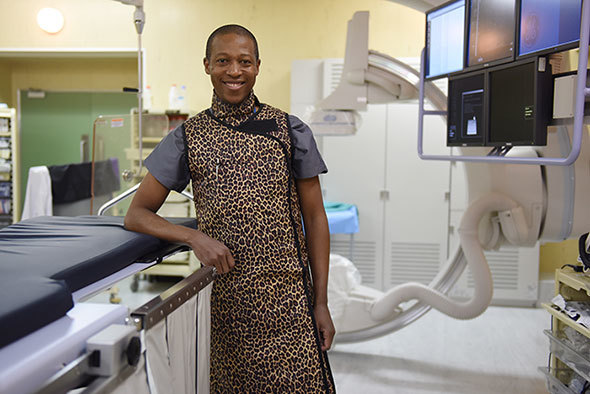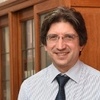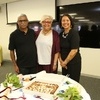The award-winning cardiologist aiming to build a healthy nation through research
09 September 2015 | Story by Newsroom
Cardiovascular disease is a leading cause of morbidity and mortality around the world. However, the spectrum of disease is different in Africa compared to the global north, where it is mainly a disease of the middle-aged and elderly. We therefore need researchers and clinicians in Africa who can respond to these local imperatives: cardiologist Dr Ntobeko Ntusi, recent winner of an NRF Award, is on the case.
Ntusi has set his life-goal high: to contribute to a better understanding of the heart diseases common among Africans and to contribute to the national agenda of building a healthy nation through research. "Heart disease in Africa still affects the young, and is often related to infectious diseases such as HIV and tuberculosis," he says.
Today we are undergoing an "epidemiological transition", he says, where we see the rise of non-communicable diseases, such as diabetes and coronary artery disease, alongside the infectious diseases. "We are going to have to find strategies to contend with these twin challenges," he says, noting this is a particularly relevant issue in cardiology, as Africa and other low-income countries are witnessing the fastest rates of increase in the prevalence of cardiovascular disease.
Among other things, Ntusi's research focuses on cardiomyopathy (a condition in which the heart muscle is abnormal, making it difficult for the heart to pump blood to the rest of the body) and inflammatory heart disease, in particular myocarditis (inflammation of the heart muscle induced by viral infections or distinct immune diseases). He is currently working to establish an independent research programme on cardiomyopathies and myocarditis, with the ultimate goal to promote clinical and research excellence locally through the training of postgraduate students and education of health professionals.
"My main interests as an academic are threefold," says Ntusi. "Firstly, the research: a focus on the generation of new knowledge and finding creative new ways to apply existing knowledge." Secondly, clinical engagement plays an important role. He says many of his research questions have been informed by his clinical experiences at the bedside. His third passion is the teaching and training of students and colleagues. "I am involved in both undergraduate and postgraduate training and supervision, as well as training colleagues on methods for advanced cardiovascular imaging."
Ntusi was born and grew up in Umtata, but during high school moved to the United States with his mother, who was studying for a PhD in Social Work education, and his younger brother. While in the US, Ntusi grew close to his high-school English teacher, Kay Sude, who he 'adopted' as his second mother; and she provided immense support, particularly during his undergraduate years, when his biological mother had moved back to South Africa. The move was an eye-opener, and Ntusi revelled in the liberal arts education he received, which combined natural sciences, humanities and art.
Ntusi graduated with a BSc with honours in molecular and cellular biology from Haverford College, and excelled at his studies: he was awarded the Howard Hughes Biomedical Fellowship and the Clementine Cope Fellowship for excellence in biomedical research, and the WW Smith prize for academic distinction.
He returned to South Africa to study medicine at UCT, graduating with an MBChB in 2003.
Both his 'mothers' were at his graduation. His biological mother, Tembeka Mpako-Ntusi, travelled from East London, while Sude crossed the seas from Philadelphia.
Women have been important guides along Ntusi's road: "I consider myself fortunate; in life I've had a group of very strong women who have been good mentors," he explains.
As he has progressed in academic cardiology, Ntusi has continued to garner awards: the latest of these is the National Research Foundation Research Excellence Award for Early Career/Emerging Researchers, for his work in better understanding cardiovascular disease, particularly in an African setting, in August this year.
Professor Danie Visser, deputy vice-chancellor for research and internationalisation, describes Ntusi as the kind of researcher UCT strives to produce. "UCT is fortunate to be home to so many researchers whose work demonstrates the value of engaged scholarship and research that impacts positively on the lives of those within and beyond their community.
"Ntobeko's work, even at this early stage in his career, encapsulates that value. His important contribution to the understanding and treatment of cardiovascular disease, specifically in the African context, can and will help reduce the high disease burden on the continent."
Ntusi says he is greatly honoured by the award, but notes that none of his achievements and outputs would have been possible without the collective effort of his colleagues, patients and research volunteers.
And with this collective effort, he hopes and needs to go far. "In 20 to 50 years' time," he says, "when we've found cures for most infectious diseases, those that remain will be mainly cardiovascular disorders, like strokes, heart failure and high blood pressure. From an academic and intellectual perspective, it's an exciting field to work in. But from a social perspective, it is truly engaged scholarship, as such work has great relevance for the communities we live in and serve."
Story by staff writer. Photo by Je'nine May.
 This work is licensed under a Creative Commons Attribution-NoDerivatives 4.0 International License.
This work is licensed under a Creative Commons Attribution-NoDerivatives 4.0 International License.
Please view the republishing articles page for more information.










